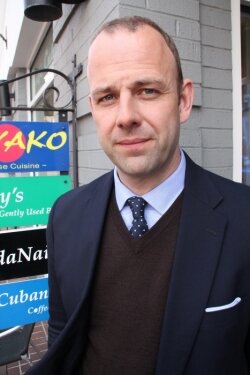Love thy neighbor: Pastor Greg Thompson brings back the beloved community
Greg Thompson wants us to learn to love each other, even if we have deep differences, and not just because he's a pastor at a local Presbyterian church and Jesus said love thy neighbor and all that, but because he believes the survival of our democracy depends on it.
Disturbed by the divisive political discourse in the country, Thompson, 39, began studying Martin Luther King, Jr. for his dissertation at UVA about seven years ago, asking himself how people with deep differences could not only live together, but flourish.
"King believed in the 'beloved community' and that we were supposed to love people we have differences with," says Thompson. "He believed, with a straight face, that America could be ordered this way."
Indeed, King's message of love is not one we hear much of these days.
"King asked us to love each other, and believed that segregation was hurtful to whites as well," says Thompson, "but nobody talks that way anymore."
So why is that?
"After he was killed, it was hard for people to embrace the 'love is the answer' thing," says Thompson. "People asked themselves, does this really work, or is it just preacher words?"
Thompson says there have been glimpses of the "beloved community" that King talked about in recent years, during which we laid down our differences and came together as a nation. However, they usually follow a national tragedy and are short-lived. Think of 9/11 or the tragedy in Newtown.
"Crises elucidate a higher vision of civic engagement; they become a clarifying moment," says Thompson, "but it's hard to capture. We see glimpses of who we can be in those moments, but we need to see those not just as nostalgic aberrations, but as a plausible kind of dialogue for the long term."
Sadly, Thompson believes we're seeing a "wholesale impoverishment of love" in our public discourse, one that may be a part of a larger spiritual crisis.
"Our political positions have become the new righteousness," he says. "Politics has come to be the place where moral frameworks are hashed out, but to place your ultimate hopes in a political strategy to secure the 'good of society' is a sign of sickness."
The current marriage debate is a perfect example. Thompson declines to state his position, but he thinks that one thing isn't being said enough.
"We have deep and profound differences among us about the nature and meaning of marriage and family," says Thomson. "And these differences are enduring; they are not going to go away. And because of this, I think one of the most important tasks before us– a task in some ways far more important than what the courts say or do– is for us to devote ourselves to learning how people with such fundamental differences can live together in mutual love."
